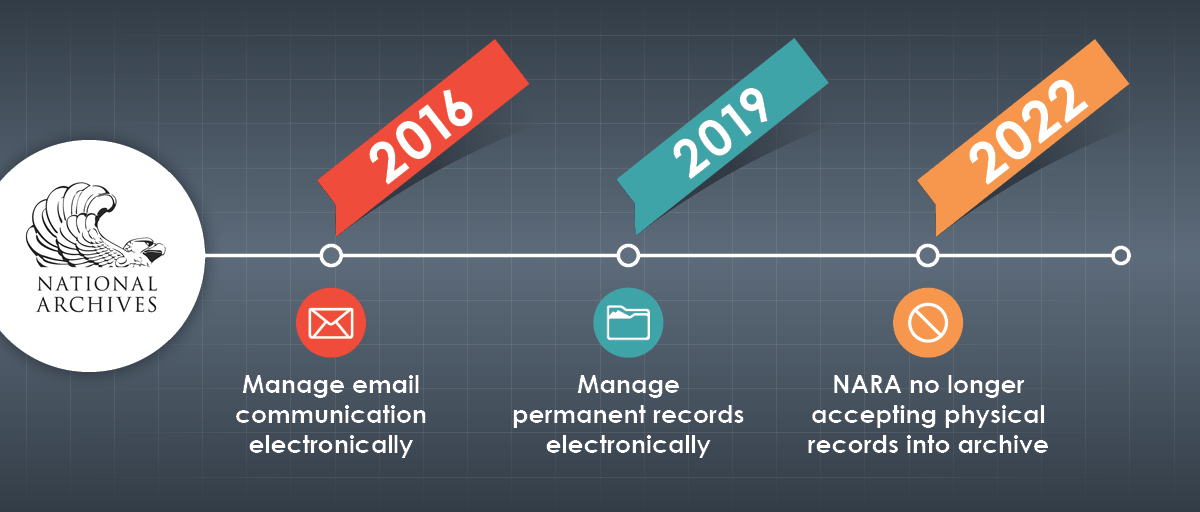Need help achieving your compliance requirements when handling federal records? Get your Ultimate Records Management Resource Kit today!
Government records management regulations, particularly those around federal record retention guidelines, have struggled to keep pace with rapidly evolving technologies.
So, it was with great excitement that I attended an AIIM 2018 conference presentation last week given by the National Archives and Records Authority (NARA) on their visionary records management modernization initiative.
Their vision is to ‘transform the American public’s relationship with their government, with archives as a relevant and vital resource. This vision harnesses the opportunities to collaborate with other Federal agencies, the private sector and the public to offer information – including records, data and context – when, where and how it is needed.’
They are taking steps to achieve this lofty vision as we move into the era of electronic records management.
NARA’s Records Management Transformation Targets
NARA started with an upfront statement about the importance of records and information as well as their commitment to making them available to the public. I mean, after all, this is what it’s all about!
NARA also laid out their digital records transformation targets for government agencies. Essentially, these targets from the Managing Government Records Directive lay out the next generation of federal records management compliance.
The first was enforced in 2016 when NARA implemented the federal records regulation that all email communication is managed electronically.
By 2019 all public sector organisations will have to manage their permanent records electronically. Finally, by 2022, NARA will no longer accept any federal records into their archives in physical format. This includes legacy content.
What this means is that agencies will be able to transfer physical items to NARA up to 2022, but after that, if they’re still holding them, they will be responsible for the digitization of this content because NARA simply won’t accept it.
This is the future of federal electronic records management!
Blog : The One Biggest Records Management Trend Since eDRMS
Why the Federal Records Modernization Initiative (FERMI) is a Gamechanger
But perhaps the modernization strategy I’m most excited about comes from the Federal Electronic Records Modernization Initiative (FERMI). This NARA records management initiative has two essential outcomes.
1. To help agencies obtain electronic records management solutions and services fitting their needs through an improved procurement process
2. To proactively address changing trends in electronic records management by setting policies for new solutions and services.
To the first point – hooray! It’s now going to be easier for you purchase systems that meet your needs! The new policies are the standout here. NARA has developed what they are calling Universal ERM Requirements.
The great thing about the Universal ERM Requirements is they’ve worked really hard on modernizing electronic records management requirements.
Previously, NARA had adopted the DOD 5015.2 standard. While the DoD’s record management standard is extremely comprehensive, it also hasn’t been updated in a very long time.
NARA’s record management requirements are modern, they are relevant and they are appropriate to our changing records management landscape.

The Future of Federal Records Management and Records Retention Guidelines
It is important to note that NARA has NOT unendorsed the DOD 5015.2 standard.
But, NARA is strongly encouraging agencies to use the new Universal ERM requirements and only apply the older standard where appropriate. I predict NARA’s new records management standard will see significant success and become the preferred standard amongst government agencies.
These NARA innovations are super interesting and I’m really excited about both these federal records management initiatives. It’ll be even more exciting to see what the future holds.
Like what you read? Be sure to subscribe to our blog to stay in the fold for all things regarding federal electronic records management, Office 365, SharePoint and more!






